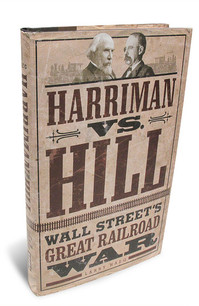Source of book image: online version of the WSJ review quoted and cited below.
(p. A13) Takeover wars seem to have lost their sizzle. What happened to the battles of corporate goliaths? Where have they gone, those swaggering deal makers? “Harriman vs. Hill” is a corporate dust-up that takes us back to the beginning of the 20th century, when tycoons who traveled by private rail merrily raided each other’s empires while the world around them cringed.
. . .
Mr. Haeg conveys a vivid picture of the Gilded Age in splendor and in turmoil. Champagne still flowed in Peacock Alley in the Waldorf-Astoria, but fistfights erupted on the floor of the exchange, and a young trader named Bernard Baruch skirted disaster with the help of an inside tip, then perfectly legal. There were scant rules governing stock trading, the author reminds us–no taxes, either. “If you won in the market, you kept it all.”
In that era, moguls were left to clean up their own mess. . . .
. . .
Though hardly a cheerleader, Mr. Haeg is admiring of his cast, nostalgic for the laissez-faire world they inhabited. Observing that the economy wasn’t upset by the stock market’s mayhem, he concludes that, “in a perverse way, the market had worked.”
For the full review, see:
ROGER LOWENSTEIN. “BOOKSHELF; When Titans Tie the Knot; Businessmen of a century ago didn’t place ‘competition’ on a revered pedestal. Merger and monopoly were considered preferable.” The Wall Street Journal (Fri., Feb. 14, 2014): A13.
(Note: ellipses added.)
(Note: the online version of the review has the date Feb. 13, 2014, and has the title “BOOKSHELF; Book Review: ‘Harriman vs. Hill,’ by Larry Haeg; Businessmen of a century ago didn’t place ‘competition’ on a revered pedestal. Merger and monopoly were considered preferable.”)
The book under review is:
Haeg, Larry. Harriman Vs. Hill: Wall Street’s Great Railroad War. Minneapolis, MN: University of Minnesota Press, 2013.

